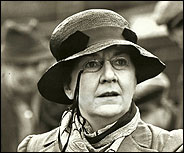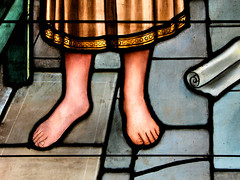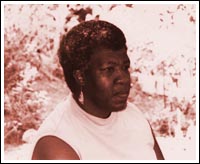You do not need to leave your room. Remain sitting at your table and listen. Do not even listen, simply wait, be quiet, still and solitary. The world will freely offer itself to you to be unmasked, it has no choice, it will roll in ecstasy at your feet. --FRANZ KAFKA
Thursday, March 30, 2006
FERTILITY GODDESSES
I also carry out serious sociological studies. For instance, I've recently noticed that it's almost mandatory for any magazine in the check out aisle to feature Britney Spears on its cover, preferably with her navel exposed.
But why? The researcher in me wanted to know. Yeah, the girl is cute enough and she can dance, but there are lots of young singers who fit that description. Why the fascination with Britney? Has she even had a hit song lately? In some photographs, the pop star herself looks fairly perplexed about all the brouhaha surrounding her.
At first, I thought that maybe Britney was just famous for being famous. She somehow captured the national imagination when she went from the innocent brunette cheerleader in her first video to blond vamp; and now her fame is some kind of self-perpetuating phenomenon. Like mold spores.
But then I realized that none of the articles even concerned themselves with Britney's music or her career. They were all about pregnancies--past, and present. That's when it all came together for me. Britney's not so much a singer or a star as she is a contemporary fertility goddess.
Who knows? Maybe the fertility of young women increases in direct proportion to the time spent staring at photographs of the Goddess's navel, or the reading umpteen articles about her various pregnancy dilemmas. It could be true, right?
My theory gained even more credibility when I saw that one of the tabloids or magazines had featured a triptych of the Angelina Jolie, Britney, and Katie Holmes. I hadn't even figured out whether Britney should stay with the troublesome Kevin or tough it out alone, and now they're saying Tom wants Katie to give birth on a ship. A ship?
Apparently, the life of a fertility Goddess is not as easy as it looks.
Friday, March 24, 2006
SADIE JENKINS

DSCN1321
Originally uploaded by patryfrancis.
I was about twenty-five when I wrote a story about a character named Sadie Jenkins. She was old; I wasn't. She was black; I'm not. She had endured experiences that I was sure would have crushed me; she survived, tougher than ever. She didn't suffer fools; and I--well, unfortunately, I do. She knew things that I couldn't possibly know.
It may sound disingenuous, but I have no idea where Sadie came from, or how she came to exert such a large influence on my writing mind. I had never known anyone like her, but for ten years, Sadie Jenkins owned my fiction. Without her, my work was flat, and labored. As soon as she entered a story, it practically wrote itself. She didn't have to be the main character--at least not all the time. All she had to do was to stroll into the fictional living room, shake her head at the mess the characters had made, and walk out. Instantly, a story that had been etched in stagnant black and white, gushed with color and movement.
Sadie kept secrets from me for years, but eventually I unearthed every last one. The final revelation came only after she died--the way it often does in life. To say I was lost, heartbroken, mired in grief for this character who had enrched my fiction for so long is an understatement. When I moaned about my problem to non-writer friends, they suggested the obvious: Rip up the death story. Resurrect Sadie. Problem solved.
But writer friends knew otherwise. Death is as serious and permanant in fiction as it is in life. If Sadie Jenkins was as real and true as I knew her to be, her demise could not be reversed. I continued to mourn. For at least a year, I wrote nothing.
And then one day I got excited about a new project. The novel rose in my mind like a great cathedral, complete with setting, complex characters, elaborate plot, and theme. On paper, however, my great cathedral was more like an empty house. I was probably 100 pages into it when I realized what it lacked. The story, the prose desperately needed the fire and spirit that Sadie Jenkins had effortly added every time she poked her head in the door. But not only was Sadie dead, she had no place in this particular novel. It was set far from the drab housing project where she spent her final years, sitting on a box by the dumpster conversing with the birds, or walking off toward town to attend a stranger's service in her bright red "funeral dress".
But as it turned out, I wasn't the only one who'd been influenced by the life changing glance or harsh wisdom Sadie J. dispensed. There were a whole legion of characters from the Sadie stories, whose fates had been altered by her presence. Though I couldn't bring the old lady back, I could transplant one of her friends and acquaintances into my new novel.
Thus, Sandra Perez, a young welfare mother with three children whose choice of men frequently drew Sadie's ire, grew older, lost a couple of her daughters to drugs, and made the decision to change her life before the neighborhood scourge claimed the third. How would she effect this transformation? Where would she go? Well, into my new novel, of course.
To my amazement, the graft took. Sandra didn't have to stay long to do the job. Simply by entering the novel's pages, she loosened tongues, broke up clunky glaciers of prose, and enlivened every character she encountered--much as her mentor had done in the past. By the time she expired somewhere in the middle of the book, she was at peace--and so was I. Sandra had done her work, both as a character-- shepherding her third daughter toward academic success and strong relationships, and as a muse, opening up both story and author.
And yet, as much as I loved Sandra, she will never be Sadie Jenkins. To this day, Sadie remains so real to me that no one could ever convince me she didn't exist. How she drifted into my stories in that red lace dress and haunted me for a decade remains a mystery, but I will always be grateful for having known her.
Tuesday, March 21, 2006
VICTORY FLAGS

Lance Armstrong winning another TdF!
Originally uploaded by belfast-biker.
Took my son to the lab today for a routine screening. While we waited for his turn, I looked at magazines; but I couldn't help seeing beyond their shiny words and pictures.
I saw a man sitting across the room, also waiting. He was younger than me--probably not yet forty. But his gaunt frame and obvious fatigue suggested he spent too much time in waiting rooms like this. He closed his eyes while he waited.
Maybe I looked too closely. The thin man's eyes snapped open and he stared at me. Then the nurse called him, and he disappeared inside, but I continued to see those eyes.
I returned to my magazine. People. It said Lance Armstrong and Cheryl Crow had broken up. I never really knew they were together--which shows how far behind I am on my People reading. The story suggested the couple separated because Cheryl had been candid about her struggles with depression. Lance, on the other attributed his survival and triumph to pushing through. Refusing to admit the darkness.
It made me think of my recent blog survey about depression. Lots of people had been very comfortable talking about their experiences with the disease. I admired their openness--and also the sense that nearly all of them had found a way to live and thrive in spite of it.
Other people seemed almost angry that depression was being discussed. They didn't believe in it! They said no to the possibility of bleak moods and seemed to think others should do the same--by moral force if necessary. At first, I didn't understand that response. But reading People at the lab, it made sense. Maybe those commenters were like Lance, and that was just their way of winning the race. They had to keep their eyes on the victory flag.
My son was called inside for his test. I watched an old couple take their seats. The woman wore a bright magenta scarf and gloves to match--her flag of victory, a talisman. I was beginning to get the idea.
Then a younger couple came in. The man was wearing business clothes like he had taken time out from his day to be there with her. She wore a sweat suit and nestled close to him while they waited. And that was their flag.
Before we left, I noticed an old man trying to put on a grey fleece jacket. He struggled against his own stiffness for ten minutes before he finally succeeded in getting it on.
Later, my son brought it up. "Did you see that old man? I felt bad for him."
"Yeah, I thought of offering to help him, but then decided against it."
"I think that would have just made him feel worse," my son said. "And besides, he finally got the jacket on himself."
And that, I thought, was his flag.
a P.S.: At Mary's inspiration, I listed my personal flags in the comment section. If anyone else would like to describe the banners you wave in the face of mortality and fear, I would love to hear them.
Saturday, March 18, 2006
MOSTLY, I DON'T KNOW THEM

Try A Grilled Sub
Originally uploaded by O Caritas.
Mostly, I don't know them--or only peripherally. Maybe a lot of us don't. Maybe that's why we don't say more. Don't grieve more.
A waitress who worked with me at the country club last summer spoke of her brother's education and wedding being disrupted when his National Guard unit was activated. He was sent three times in all, and forced to cancel the wedding twice, but ultimately returned home safely. In the end, he married quietly, too superstitious to plan another gala event.
A neighbor encountered when I went out to get the mail mentioned that a nephew had gone, but I didn't hear anything after that. I don't think I asked.
Then, a couple of months ago, a friend called to invite my son to his going away party. He had enlisted in the army. Trevor worked with my son at his after school job at the sub shop. Think skinny, slouched, with long hair pulled into a ponytail and a great smile. They said he liked to smoke a little weed behind the shop during his break. Still, he was so responsible that the boss left Trevor in charge when he was off. His parents owned a tiny cluttered house near the shop where friends and co-workers frequently hung out after work. I remember the big flag hanging in the front yard.
After he graduated from high school last year, Trevor went full time at the sub shop. I don't think he saw a lot of alternatives. It's almost easy to see the appeal of the army. The travel. The chance to be someone else. Even the danger. He recently called my son to say he was graduating from boot camp. He boasted about the shape he was in, the muscle he'd put on, but didn't mention what would come next.
We found that out a couple of days ago when my husband ran into Trevor's sister. Her brother's heading for Texas now--and then to Iraq, she said, attempting a nervous smile.
His nineteenth birthday is still some months away.
Thursday, March 16, 2006
IN THE PARKING LOT

you're free now...
Originally uploaded by lorenzodom.
Haven't had much time to write lately. Or to practice yoga, go to the gym and walk around feeling strong, read novels or poetry and get so excited about a paragraph or a verse that I hector everyone around me to STOP EVERYTHING and READ THIS right now. Haven't had enough time to meditate, or sit and drink my tea, talk on the phone with friends, surf blogs and say Amen! to the wonderful insights and stories I find there. Haven't had time to do the things that make my hours sing, and make me feel satisfied at the end of the day because I did what I needed to do. The things that allow me to name a day GOOD.
No, lately my days have been different. People I love have needed errands run, rides given, phone calls made, hours spent mulling decisions that need to be made or sitting in doctor's offices wondering how to explain a life to someone who may or may not give a damn. Have had to look into those faces in those offices and try to make them understand.
In the past, I would have really been thrown by this disruption of my routine, this unglodly interference with my "goals". But not this time. This time I've accepted that right now this is what I need to be doing, and it, too, is good.
This afternoon, arriving at the grocery store with my mother where I was shopping for three households, I was stopped by a lethargic supermarket employee. It was windy and this young woman clearly didn't want to push the two shopping carts she'd corralled uphill and into the store.
"Here, why don't you take these two?" she said in a helpful tone.
"Okay. Thank you," I said, pushing the carts up the hill. (Of course, one had a recalcitrant wheel.)
"You could have gotten a cart inside; she was just trying to get you to do her job," Mom pointed out.
"I guess she was," I said, still pushing.
"And you thanked her for it."
"I'm happy to be of service," I said. Really, I hadn't been all that happy about it, but saying it suddenly made me feel I was.
We had reached the top of the hill, and my mother took my arm. "What a wonderful attitude," she said, smiling at the bright day around us.
I didn't bother to explain that my attitude wasn't particularly a virtue. In fact, I'd invented it on the spot.
Then, leaving the store, my mother didn't want to get in the car.
"What's the matter?" I asked. We had two grocery carts full of food, and my mother was insisting she help load them into the trunk--despite a severe case of bursitis in her shoulder. I just wanted her to sit and rest.
"I was thinking of my father," she said. "And how once I had taken him somewhere, and I must have gotten impatient with him."
Really, I hadn't been impatient with Mom--at least, I don't think I had, but I'd felt the edges of impatience. Perhaps she had sensed it.
"What happened?" I said, allowing her to lift some the light bags , realizing that she didn't want to sit in the car and rest. She wanted to be of service, too.
"He pointed his finger at me and said, 'Someday you'll be old, too. And you know when?"
I stopped what I was doing and waited for her to finish.
"Sooner than you think. Much sooner than you think."
Tuesday, March 14, 2006
FINAL WORDS

As Emma Goldman in 'Reds'
Maureen Stapleton, who was honored with just about every award an actress can attain, died yesterday at the age of 80. This morning, as I sat drinking my coffee and reading the New York Times, I encountered her distinctive voice one final time. Right there in my own kitchen.
I love the exuberance and freedom of the way she described how she arrived in New York, determined to become an actress:
"I was seventeen years old, I weighed 180 pounds and I had a hundred bucks in my pocket. I was invincible!"
Though I never weighed 180 pounds or aspired to be an actress, I know that feeling well. Equally eloquent and telling was this deceptively simple response to her numerous successes.
"I did the best I could."
I can't imagine a more honorable epitaph.
___________________________________________
Meanwhile, I hope no one will miss the comments in the survey on bloggers and depression below. No definitive answer has been reached--nor did I hope for one, but the responses make for rich and insightful reading.
Saturday, March 11, 2006
BLOGGERS AND DEPRESSION: a survey

Black dog walking
Originally uploaded by goddess_spiral.
Many blogs I visit have dealt with the subject of that black and hungry dog who returns again and again with the same baleful expression.
Depression takes many forms. Sometimes it is temporary and situational. Other times it is a lifelong challenge. It can be a crushing weight that makes it difficult to get out of bed for days at a time, or a vague sense of unease or self-doubt that allows life to go on, but never with the fullness or zest that it might have. It can be helped, but rarely eradicated with medication.
Though I have not written about it here, I once experienced an episode of post-partum depression that lasted nearly a year. Thus I read with great empathy whenever I happen upon a blogger who has awakened one morning to find the black dog standing outside the gate. Where it comes from is frequently unknown; how long it will remain, or how much it will demand from us during its stay is more troubling still.
A couple of times blog friends, after writing several posts about low moods, have simply and abruptly vanished. This is the most frightening development of all because as long as we're creating poetry or photographs , journal entries, or postcards from our pain, then we're unvanquished. Even if all we can write is: I hurt.
Silence is the black dog's ultimate victory.
So here's my survey question. Of course, any answers are speculative and subjective, since there is no hard data on the subject. But often in the lone subjective voice speaking its own truth, we find the greatest wisdom.
Do you think depression is particularly prevalent among bloggers? And if so, why?
a) Absolutely not. "Bloggers" are a group as diverse as society itself, no more prone to depression or any other illness than anyone else.
b) Since creative people in general are more prone to mood disorders , it is likely that bloggers suffer more depression than average.
c) The blogs I read seem to bear this out.
d) The blogs I read seem to contradict this.
e) Depression is an epidemic not only among bloggers, but in society in general. Perhaps it is even a "sane" reaction to the stress and uncertainty of contemporary life.
f) other
Sunday, March 05, 2006
A CONFESSION FOR ASH WEDNESDAY

Glass Feet
Originally uploaded by eye2eye.
This being written on Ash Wednesday, I have a confession that needs to be heard. I told a lie. A lie I once considered to be the one unforgivable sin of my life. And what was worse, I told it in Church. To a priest in a red tasseled hat.
But no lie--not even an unforgivable one, not even one told in church and to a Monsignor, springs from nowhere. They all have a history, and what’s more they have a purpose. There are lies of omission, and lies told in kindness, calculated lies, and spontaneous embellishments. In fact, there’s probably as many varieties of lies out there as there are liars. And that’s a lot.
Then there are the lies you tell because more than anything you wish they were true. I think my unforgivable lie was one of those.
As a child, I often played with my next door neighbor, Elsa. We were both only children, but our lives were vastly different. Elsa lived with a grandmother, who was considerably more well-off than most of the people in our working class neighborhood, but determined to raise her granddaughter with Depression sensibilities. Before she could play, Elsa had a long list of chores to do, followed by hours of practicing her piano. She wore the same dress--invariably something purchased at a thrift shop-- to school all week in order not to waste water or labor washing them.
I know this sounds Dickensian, but I believe her grandmother loved Elsa, and thought she was teaching the child values like discipline and fortitude. They were just the wrong values for the era. These were the child-centered years when the ME generation was just coming into its own. Chores? Unwanted music lessons? Excuse me?
I used to sit on her porch, listening as Elsa practiced the piano; I cringed when she missed a note because I knew what would follow. The grandmother who spent the afternoon on a day bed with her Chihuahuas in her lap, would reach out and crack her hand with a yardstick.
“Play it again, she’d say. “And this time, do it right.”
In our secret place in the woods, Elsa confessed what her piano teacher had told her: she’d never be any good no matter how many hours she practiced. Nor was she ever much of a student. Her ill-cut hair and Depression style dress insured her status as an outcast from the moment she entered the school building. She stole my toys when I wasn’t looking, and drew me into numerous fights in her defense, but I loved that girl beyond reason.
See, Elsa was more than a friend; she was the little sister I never had. Her straight and perfectly black hair felt like a miracle to me when I brushed it in the sun; the memory of her knobby bones fills me with love to this day. But most of all, I can still remember the wild laughter with which she greeted the day when finally released from her hours at the piano.
One day, when her grandmother hit her once too many times with the yard stick, Elsa hid in my closet, refusing to answer the old woman’s calls. At the time, I was preparing for my First Communion, and it was a Sunday school day. A particularly important Sunday school day. We were meeting in the church where Monsignor would quiz us on the tenets of the faith.
Don’t ask me how I got her to the church because I don’t remember, but somehow I smuggled Elsa inside, and hid her under the pew. She sat quietly, looking up at me in the dark space, her black hair a fringe beneath her beret. While I recited my answers in trepidation, she held my hand and nodded at every correct response. Her face never left mine.
We’d nearly finished the class when the boy beside me raised his hand. He looked pointedly at me before he spoke. From her spot on the floor, Elsa gripped my hand more tightly. In an instant, the Monsignor was standing beside the pew, calling Elsa out. Standing in the center aisle, her Depression skinniness, and the dress she’d been wearing for four days were accentuated by a slant of light that came through the stained glass window.
“What’s your name? And why are you hiding in the Church?” the Monsignor said not unkindly. He was an elderly man, arthritic, but I remember him crouching, meeting her at eye level.
But like spies and fugitives everywhere, Elsa was determined to reveal nothing. She lowered her head in eloquent muteness.
“Does anyone know this little girl?” the Monsignor asked, turning to the class.
I was silent for an instant, before I stood straight up, and in the presence of all the holy icons of the church, told my lie--loud and clear. “She’s my sister. My mother wasn’t home so I had to take her to Sunday School with me.”
It was a purely gratuitous lie. The truth--that she was a friend, and would be going home with me when my mother picked me up--would have satisfied the Monsignor just as well.
Elsa looked up from the center of that shaft of light and smiled widely--the way she did when she was released from her chores for the day. And I smiled back. For that one moment, we were no longer onlys. We each had the secret thing we’d always longed for: a sister.
I suffered mightily for the lie I told to the trusting old Monsignor. When we prepared for first penance, I rehearsed how I would confess it. But every time I tried to speak my sin out loud, it sounded more unforgivable. I imagined God’s thunder cracking the confessional booth in half when I filled it with my travesty.
Of course, as I grew older, I laughed at my child-self for her overdeveloped conscience. The story I told the Monsignor was an entertaining example of “Catholic guilt” when I was in college.
Only now when I look back and remember Elsa standing in the center aisle with her bowed head, or crouched below me, squeezing my hand in encouragement as I recited my catechism, I understand the true nature of my unforgivable lie: It wasn’t the lie I’d told to the Monsignor that mattered. It was the lie I told to Elsa.
It is perhaps a common lie. We outgrow people we say we love. We “move on.” As we grew up, I would disown the girl I’d called my sister a little more completely every year. I would pretend I didn’t know the secrets we told each other in the woods or the bump of her bony knees during a sleepover. Perhaps predictably, Elsa grew into a wild adolescent, an intractable outsider, the magnificent black hair bleached platinum, her old world name jettisoned for a new nickname and a persona to go with it. She became “Sunny”; and I became someone who pretended I didn’t know her.
The last I heard of Elsa she was a drug addict living in Florida. And yet the moment in the church remains. The moment when I told the Monsignor that she was my sister. The truth of those words continues to haunt me.
Saturday, March 04, 2006
WHY READ POETRY?

black-eyed Susan
Originally uploaded by mimbrava.
While poets argue among themselves about the relative virtues of "accessible" and "cutting edge," many people have stopped listening, stopped reading, stopped believing that most contemporary poetry makes a difference.
For me, when it comes to poetry, the only criterion that matters is this: does the poem give me something I need to have; does it tell me something I need to know; does it crook its metaphorical finger and lead me some place I've never been, but recognize instantly?
If it does those things, it doesn't much matter if it's plainspoken or abstruse. I'm following, I'm listening, I'm buying poetry books.
Mary Oliver recently selected Suzanne Frischkorn and Judith Valente for the Aldrich prize. In her introduction to the book that contains both their work, she says that what she looked for was "genuineness."
I particularly love this poem by Suzanne Frischkorn which opens the book:
A FRIEND ASKS, WHAT'S TO FORGIVE?
Forgive me, I can't name the scarlet birds
that dart through the bramble.
Forgive the marsh through the lace curtain--
veiled, remote.
Forgive the wood thrush, and the larkspur.
Forgive the incantation of crickets among burrs--
to each star and one moon.
Forgive me as I light candles for the living
And because I scrape wet stones
in search of happiness. And forgive
all the damp places, their echoes
their solitary drops of water.
Forgive the orchid, the only flower
of meditation.
And forgive the catmint,
the cosmos, and the black-eyed susans
for their tenacious grip on dry earth.
A copy of Suzanne's, Spring Tide and Judith Valente's Reinventing the Alphabet is available on Amazon, or through Suzanne's blog, Lit Windowpane.
Thursday, March 02, 2006
OCTAVIA E. BUTLER 1947 - 2006

A lot has and will be written about Octavia E. Butler, the science fiction writer, who died this week--but not nearly enough. I do not normally read in her genre, but the pure originality of genius deserves to be read wherever it is found. Rather than speak about her, I will let her speak for herself as she did in life, with an eloquence which we can only pray is not prophetic.
This from her 1998 futuristic novel, PARABLE OF THE TALENTS set in the year 2032:
I have read that the period of upheaval that journalists have begun to refer to as "the Apolalypse" or more commonly, more bitterly, "the Pox" lasted from 2015 through 2030--a decade and a half of chaos. This is untrue. The Pox has been a much longer torment. It began well before 2015, perhaps even before the turn of the millennium. It has not ended.
I have also read that the Pox was caused by accidentially coinciding climatic, economic and sociological crises. It would be more honest to say that the Pox was caused by our own refusal to deal with obvious problems in those areas. We caused the problems: then we sat and watched as they grew into crises...I have watched as convenience, profit and inertia excused greater and more dangerous environmental degradation. I have watched poverty, hunger, and disease become inevitable for more and more people. Overall, the Pox has had the effect of an installment-plan World War III.